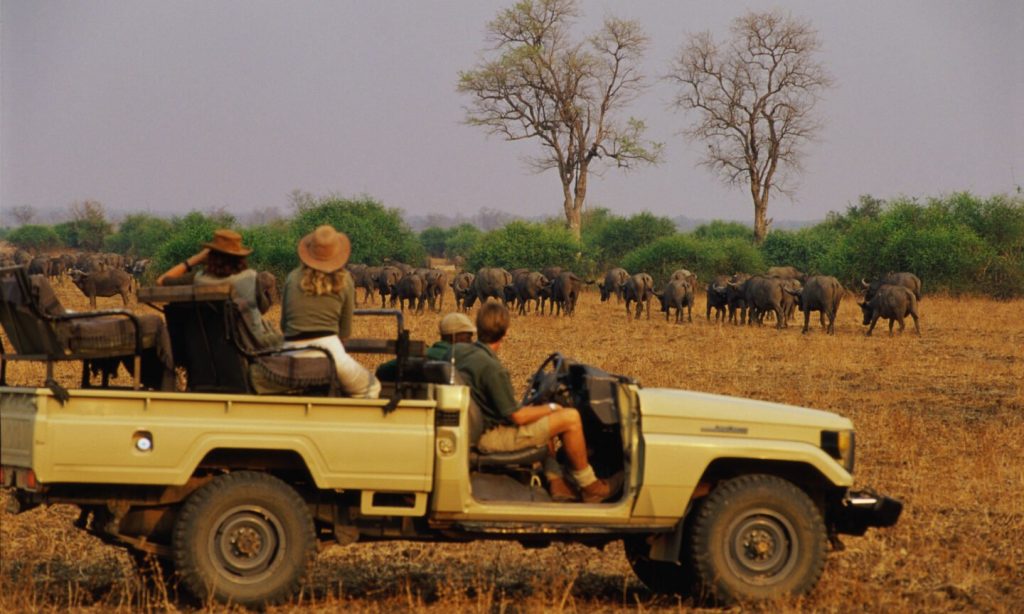A safari is a guided tour, usually in Africa, that can bring you up close to elephants, zebras, giraffes, lions, rhinos and more. Often, these adventures involve taking open-sided safari vehicles into nature and observing and photographing wild animals in their natural habitats. (Other safaris are for hunting; here, we’ll focus on the former.) If you’re planning your first safari, here are some tips.
1. Work with a travel agency that specializes in planning safaris
An elephant walks through the northern Serengeti. (Photo by Josh Garber)
Even if you’re an avid traveler, safari planning is still best left to the professionals. By using a reputable safari planning travel agency like Yellow Zebra, Abercrombie & Kent or Timbuktu, you can get several benefits:
-
Guidance on when and where to go based on your wants and needs. Your safari planning expert will likely have relevant information on where to go based on weather, animal migrations and what you’re looking to get out of your safari. (For instance, if you want to see hordes of wildebeest in July, your safari adviser might guide you to a different destination than if you’re looking for rhino encounters.)
-
On-the-ground experience about accommodations. Some safari planners have visited the properties themselves or have colleagues who have, which helps give you a better idea of what to expect before you book a property.
-
Help arranging transport during the safari. Even after you have the property you’re staying at sorted out, depending on where you’re going on safari, you may benefit from help arranging transport. For instance, if you’re flying to the northern Serengeti for a safari, you’ll likely fly into Kilimanjaro International Airport, but after that you may need to take a few additional, smaller flights to get closer to your accommodation (and even once you land at the airstrip closer to your accommodation, you’ll likely need a guide to pick you up and take you to your final destination). If you use a travel agency, it can set up all the internal transportation for you — and you’ll be thankful it did.
-
Advice about side trips to complement your safari. Even if you’re interested only in going on safari, you may want to talk to your safari travel adviser about nearby non-safari destinations to check out. For instance, you can add on some beach time in Zanzibar after your Serengeti safari or if you’re going on safari in South Africa, you could consider a beach trip to Mozambique afterward.
🤓Nerdy Tip
If you have a friend or family member who booked a safari through a travel agency and enjoyed their experience, tell the safari agency that you’ve been referred and it will sometimes offer you a discount on your booking.
2. Buy and bring the right equipment
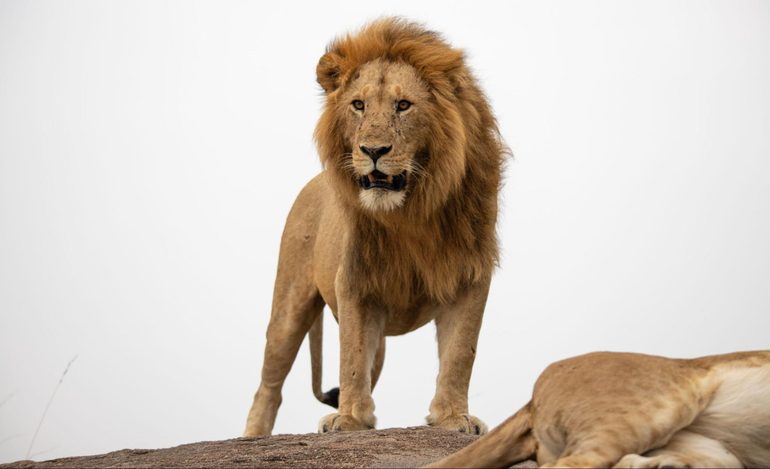
A male lion protects a sleeping female lion. (Photo by Josh Garber)
There might not be many stores near your safari accommodation, so you’ll want to make sure you buy and bring the right equipment with you. Here are some items that you might want to bring on your safari:
-
Binoculars. Bringing a good pair of binoculars (we recommend either 8x, 10x or 12x magnification) will enhance your travel experience so you can see animals that are farther away, see birds better and get a closer view of your safari experience. Note that some safari accommodations offer complimentary use of binoculars during guests’ stay, so you should check with your accommodations before purchasing binoculars.
-
Camera. Rather than relying on your smartphone, consider purchasing or renting a camera with a telephoto lens so you can capture animals from far away for the best safari pictures. If you’re new to photography, you may want to take a few photography classes or watch instructional videos so you’re prepared to get the best shots of the animals and landscape during your safari.
-
Clothes that are appropriate for your safari. In general, you want to wear natural colors that blend in with the environment. Blue and black can attract tsetse flies, and try to stay away from bright colors. Additionally, depending on where you’re going, temperatures can fluctuate from cold in the mornings to hot in the afternoons, so you may want to consider safari pants that can be unzipped at the knee and turned into shorts.
-
Sunscreen and a wide-brimmed hat. There are days where you might spend 10-plus hours on the road and you want to make sure your skin is protected. Bringing sunscreen with you and wearing a wide-brimmed hat on your journey can help to protect your skin.
-
Bug spray. To help prevent mosquito and other insect bites, consider bringing bug spray such as DDT. Before deciding which bug spray to pack, check with local regulations to see if any chemicals are banned in the country you’re visiting.
Bringing the right gear can enhance your safari experience.
3. Check to see whether the planes that you’re flying to your safari have weight or other restrictions for luggage
Depending on where you’re going on safari, you may be in small planes that have luggage requirements that you may not have had to follow for other trips. For instance, Coastal Aviation in Tanzania has the following luggage restrictions for light aircraft flights:
-
Weight allowance of 33 pounds (15 kilograms) per person, including hand luggage.
-
All luggage must be in soft bags (i.e., duffel bags).
🤓Nerdy Tip
If you’ll be away for a week or more, check with your safari accommodation to see if it offers laundry services, which can help you pack lighter.
4. Embrace the experience, and expect accommodations that may be outside of what you’re used to
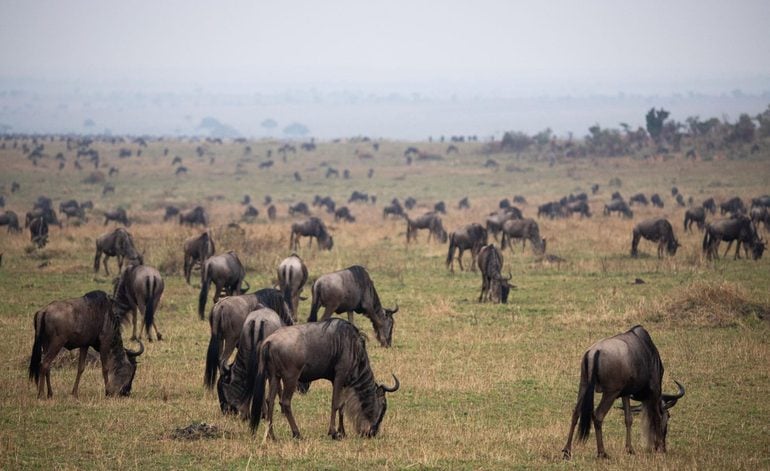
Wildebeest gather in the northern Serengeti. (Photo by Josh Garber)
While there are some more traditional hotel options you could book on safari — such as Four Seasons Safari Lodge Serengeti and the JW Marriott Masai Mara Lodge — you may find yourself booking a safari where the accommodations are more akin to camping (albeit higher-end camping) than a hotel.
For instance, Wayo Serengeti Green Camp in northern Tanzania is so close to the animals that you can find zebras outside your accommodations, and you can even take walking safaris, but the camp differs from typical hotels in many ways, including:
-
“Bucket showers” instead of typical showers. (A bucket shower is basically when the staff warms water up upon request and then fills a bucket outside of your tent that connects to the shower in your tent.)
-
No Wi-Fi or electrical plugs in your room, with Wi-Fi and charging only in the common area.
-
Set lunch and dinner times with no room service, although many camps will provide you with a bagged breakfast, lunch or dinner upon request.
-
You may need to be escorted to and from your tent at night to ensure your safety, including using a flashlight to alert the staff when you’re ready to be picked up from your room.
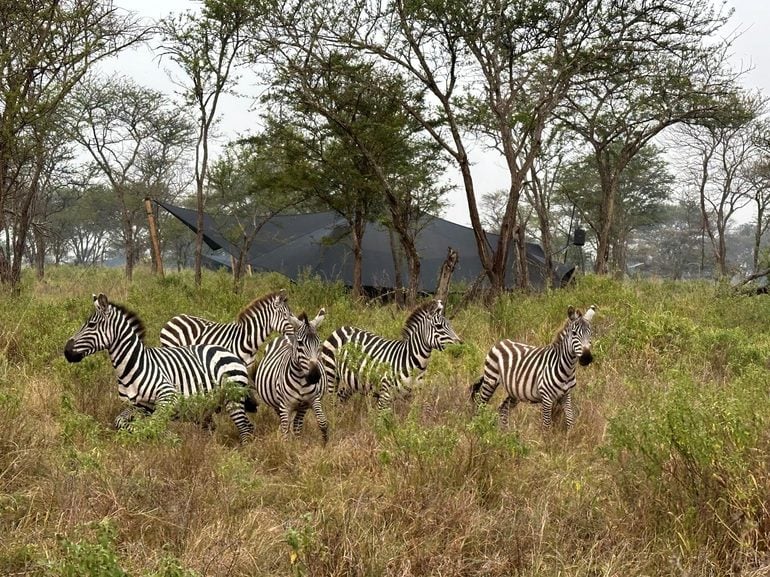
A group of zebras outside of lodging at Wayo Serengeti Green Camp. (Photo by Josh Garber)
If you’re booking a safari camp instead of a hotel, you should embrace the experience so that you can fully enjoy the tranquility instead of focusing on how the camp differs from the type of hotel experience you might normally book.
5. Look into what shots, medicines and visas you may need for your trip
As soon as you can after booking your trip, you should look into whether you need any special shots, medicines or visas for your safari. For instance, you must have a yellow fever vaccination and certificate to enter Kenya, Uganda and the Republic of Congo. Additionally, Tanzania requires citizens of the United States to get a visa to enter the country (note that you can pay for the visa on arrival).
We recommend booking an appointment with your doctor or going to a travel clinic to discuss shots and medicine and using the U.S. Department of State’s website to learn about the visas you may need.
How to book a safari on points
Safaris can be expensive, and a great way to save money on your safari is to use points. There are a couple of ways that you can book a safari on points:
-
Book your flights using points. A round-trip ticket from Los Angeles to Kilimanjaro, Tanzania, from June 2 to June 16, 2025, currently costs $1,704 in cash or you could use 139,000 Flying Blue miles and pay $441.10 in fees for the same flights. American Express, Chase, Capital One and Citi all let you transfer points to Air France’s Flying Blue program.
-
Book your accommodation using points. You can use points to book your safari accommodation either by booking a hotel like the JW Marriott Masai Mara Lodge, which allows Marriott Bonvoy members to pay for the stay with points, or by paying for your lodging with a credit card that lets you use points to offset the total balance owed, like Chase’s Pay Yourself Back program.
Even if you’re only able to offset a portion of your safari using points, it can help reduce the overall cost of what could otherwise be an expensive adventure.
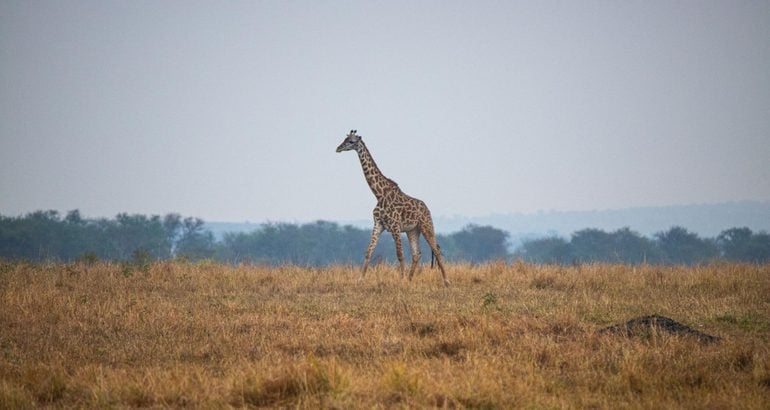
A giraffe walking through the Serengeti. (Photo by Josh Garber)
